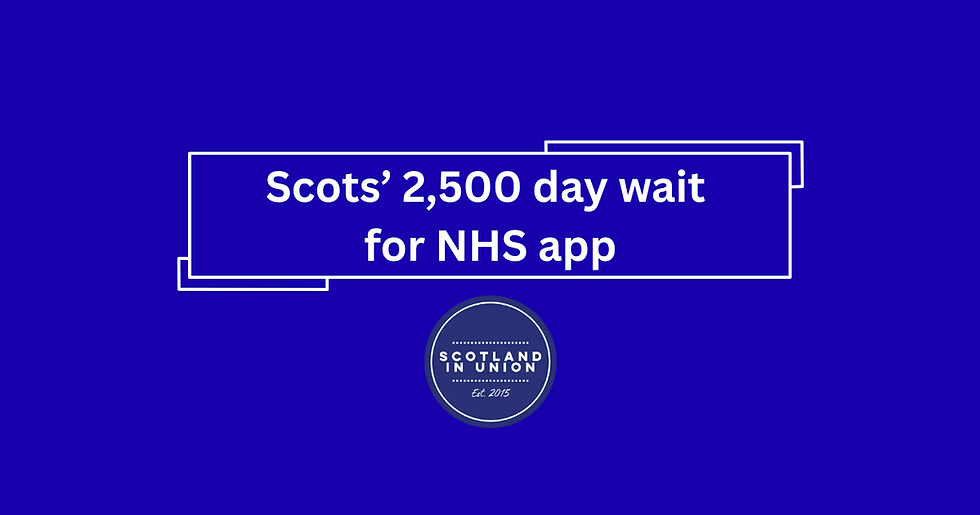Budget breakdown
- Scotland in Union

- Oct 30, 2018
- 3 min read
Updated: Dec 20, 2023
IT was the final budget before Brexit, and the Chancellor boldly claimed it signals the end of years of austerity.
A windfall from better tax receipts will be spent on the NHS and income tax cuts south of the Border.
Today’s newspapers called it ‘Hammond’s giveaway gamble’, but political opponents have insisted that spending is still being squeezed.
Here are the headline announcements and what it means for Scotland.
Budget at-a-glance
Public spending will go up next year, but most of that will go to the health service in England.
There will be no real-terms increase for other departments – triggering a row about whether austerity is really over or not.
The NHS will receive an extra £20.5bn over the next five years, which had been widely trailed in advance.
The biggest surprise in the budget related to income tax. The personal allowance threshold, the rate at which people start paying income tax, will rise from £11,850 to £12,500 in April - a year earlier than planned. That will apply to everyone in the UK as it’s reserved to Westminster.
But for taxpayers south of the Border only, the higher rate income tax threshold – the point at which people start paying tax at 40 per cent – will rise from £46,350 to £50,000 in April.
That’s a tax giveaway for millions of workers who earn above the average wage, sparking another political row.
Beer, cider and spirits duties will be frozen, but wine drinkers will not be so lucky with duty to rise by 8p in February.
Work allowances for the new welfare system of universal credit – a major political flash point - will be increased by £1.7bn.
What it means for spending in Scotland
The budget has a direct impact on the block grant from Westminster that goes to the Scottish Government.
It will INCREASE in cash terms by £866million next year, and also go up in real-terms – taking inflation into account - by £382million.
That reality is deeply frustrating for the SNP, which yesterday resorted to smoke and mirrors in an attempt to distort the figures. A graphic widely shared on social media by Nationalist politicians claimed ‘the Tories are cutting Scotland’s budget by £1.9billion’. The small print explained this was actually a comparison with 2010.
The period since 2010 has of course seen financial restraint as the country recovered from recession. It was also a period where North Sea oil revenues collapsed, so just imagine what would have happened to Scotland’s finances had we been independent.
How the SNP spends the 2019 cash windfall is up to Finance Secretary Derek Mackay.
Much of it stems from the NHS spending increase in England, but he doesn’t have to pass it on to our devolved health service.
He would be well advised to do so, however, after it was recently revealed that the SNP actually cut NHS spending last year in real-terms.
What about Scottish taxes?
As a result of the pre-referendum promises made by Unionist parties, highlighted in the famous ‘Vow’ and delivered in full, income tax is now devolved to the Scottish Parliament.
That means the increase in the 40p tax threshold to £50,000 won’t apply. It currently kicks in at the much lower level of £43,431 in Scotland – and is actually 41p.
Derek Mackay is due to unveil his draft budget in December, and he now faces a conundrum. Even if he raises the threshold by inflation, taking it around £44,500, the gap between Scotland and the rest of the UK will be huge.
Expect this to be a major political football in the coming months.
What it does show is that SNP has the powers to make major tax and spend decisions. If ministers choose to reject tax cuts introduced by the Tories, as observers anticipate, they will have extra revenue to spend on public services in Scotland.
Whether austerity is over or not is an argument that will rage for years to come. But what should be over is the SNP argument that Westminster is to blame for the state of Scotland’s finances.
Unfortunately, it won’t stop the Nationalists as they continue to launch desperate attempts to divide the country and force an unwanted and unnecessary second independence referendum upon Scotland.









Comments